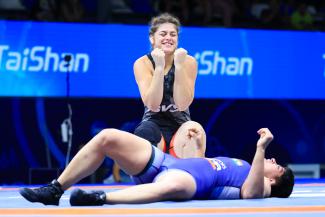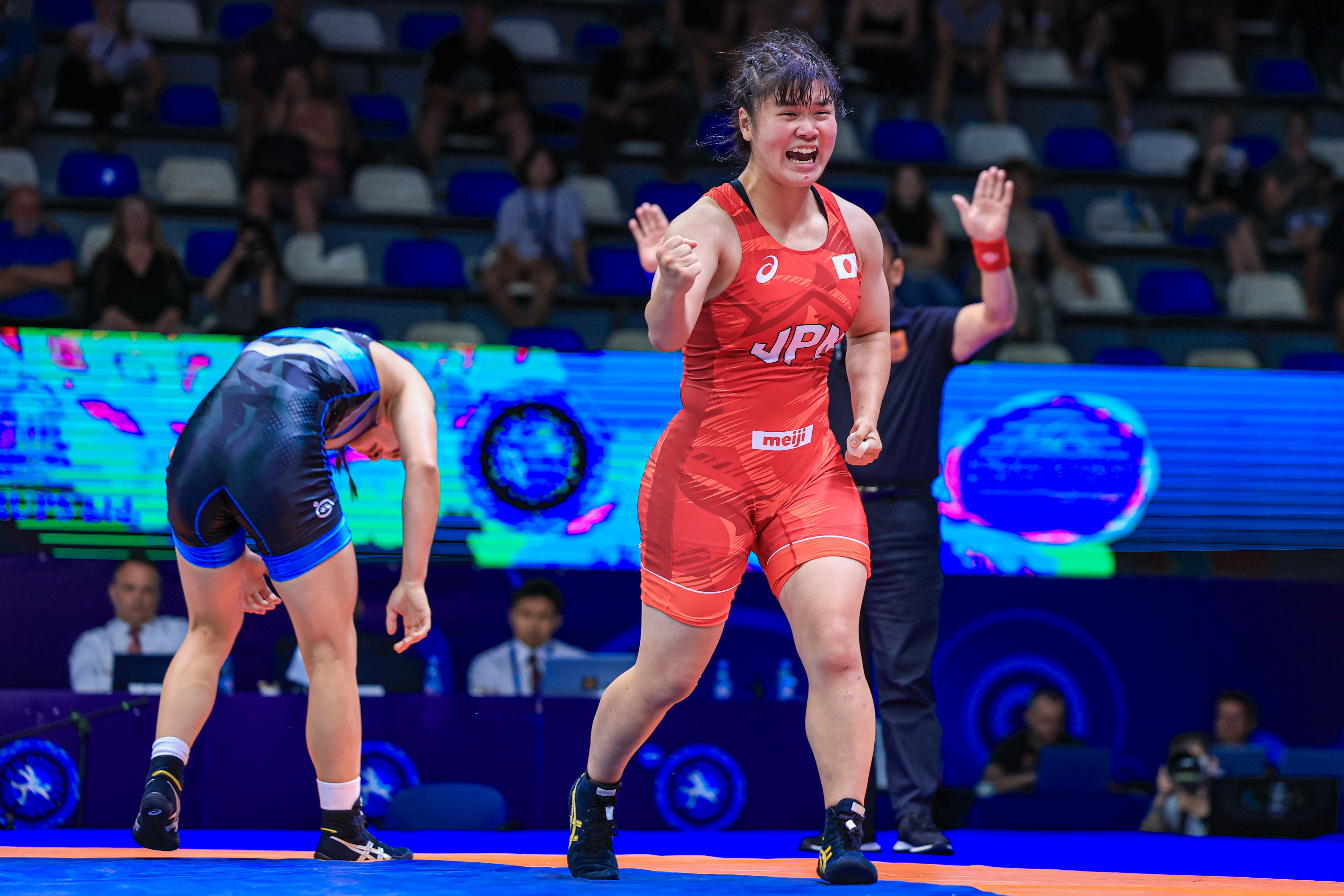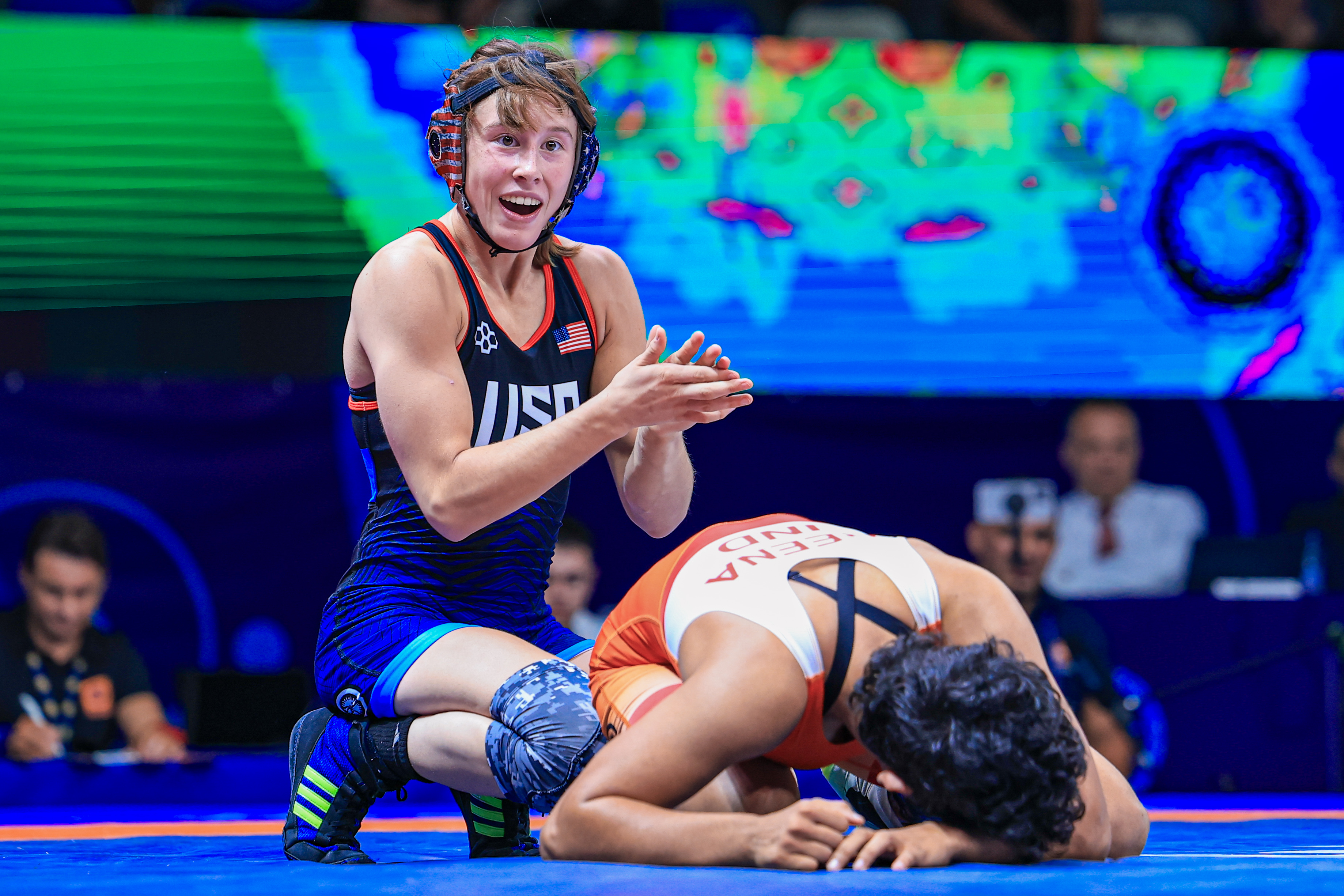Higuchi claims 61kg title in first senior world foray
Monday, September 19, 2022 - 00:05 By Ken Marantz

BELGRADE, Serbia (Sept. 18) -- After quixotic attempts to make Japan's team to the Tokyo Olympics at both 57kg and 65kg ultimately failed, 2016 Rio Olympic silver medalist Rei HIGUCHI (JPN) settled in at 61kg for now.
He now has his first senior world title, although it had never really mattered to him before. Higuchi put on one final, dazzling performance in sweeping past Reza ATRI (IRI) by 10-0 technical fall to win the 61kg gold as the World Championships concluded with the final three freestyle finals on Sunday in Belgrade.
"I was finally able to show my actual strength, and I'm glad I could have a solid win in the final without any incident," Higuchi said.
In other finals, Asian champion Rahman AMOUZAD (IRI) signaled a possible changing of the guard at 65kg when the 20-year-old won the gold in a 21-point thriller, while Kyle SNYDER (USA) was hardly troubled in securing his third career world gold and first since 2017 at 97kg.
Higuchi, who won his first senior Asian title in April, had Atri on his heels from the get-go, working his slick tackles to perfection and transitioning well into exposure situations.
The 26-year-old Japanese opened with a double-leg takedown to a lace-lock roll. He then got 2 with a single-leg tackle, secured an inside-leg hook, and forced Atri over for two exposures to end the match at 2:42.
"Yesterday the Iranian looked very strong, so I closely watched all of the videos of him, like the Poland tournament before the Olympics and various others," Higuchi said. "I watched them all. I think analyzing him was a reason for my victory."
With Higuchi's victory, Japan finished a surprising third in the team standings with 70 points, two ahead of Mongolia and Georgia. The United States, which had clinched the team title after the morning session on Saturday, finished on top with 198 points, followed by Iran with 150.
The bulk of Japan's points came on gold-medal runs by Higuchi and Taishi NARIKUNI (JPN), the champion at 70kg on Friday. It marked the first time that Japan had two gold medalists at the same World Championships since 1979, when Yuji TAKADA (JPN) and Hideaki TOMIYAMA (JPN), the latter currently the president of the Japan federation, won in San Diego.
Such trivia doesn't really interest Higuchi. He was more excited about surpassing his coach Kenichi YUMOTO (JPN), who won Olympic silver in 2008 and world bronze in 2011.
"I don't really think about records," Higuchi said. "I have always aimed at being fundamentally sound like coach Yumoto, and I'm so happy to have been able to top him in one way. From when I was little, I studied videos of him and tried to imitate everything he did, the way he grabs arms, gets a high crotch, his single-leg tackles."
Higuchi's run to the world gold caps the roller coaster ride his career had been on since he took the silver medal at the 2016 Rio Olympics when he was dealt a close 3-3 loss in the final by Vladimir KHINCHEGASHILI (GEO) on a late activity point that still stings for Higuchi.
His obsession with making up for that loss and winning an Olympic gold has been the driving force over the past six years, and it was only until recently that he even regarded winning a world or Asian title as worthwhile.
"The Olympics had always been the only thing that concerned me, but eventually I changed my pessimistic thinking of not entering the World Championships or not entering the Asian Championships," he said. "I've always been thinking of how I can win an Olympic gold medal, so I'm not satisfied with this victory. There are still many issues of things I need to work on and fix."
Higuchi's attempt to qualify for the Tokyo Olympics was marked by perseverance and, ultimately, disappointment.
First, he moved up to 65kg, a tough division for someone standing just 1.63 meters, where he would challenge world champion Takuto OTOGURO (JPN). He actually defeated Otoguro once and won the 2018 world U23 gold at that weight, but eventually lost out to the eventual Olympic gold medalist.
In 2019, he made the drastic decision to drop back down to 57kg, which he had not competed in since Rio. His weight had ballooned up to 68kg, and he had only a few months before the All-Japan Championships, which would determine who would go to the Asian Olympic qualifying tournament in 2020.
Limited exclusively to a vegetable diet, he made the weight, then defeated 2017 world champion Yuki TAKAHASHI (JPN) to earn the spot. But then the Olympics and the qualifying tournaments were postponed for a year, meaning he had to maintain his weight at the height of the pandemic for another year.
When the Asian qualifier was finally held in April 2021 in Almaty, the unthinkable happened. Higuchi failed to make weight.
Takahashi was dispatched to the final World Olympic qualifier, earned Japan a spot at 57kg, then defeated Higuchi in a playoff to fill it himself. At a crossroads, Higuchi looked deep into himself to determine what path he would take.
He decided he would spend this year at 61kg, enter the major tournaments that he had previously shunned, and make preparations for a run at the 2024 Paris Olympics, which he said will be at 57kg.
For the Japanese wrestlers, the qualifying path for Paris begins with the All-Japan Championships this December, the first of two domestic qualifiers for next year's World Championships.
His sojourn at 61kg was a positive experience. "Not once did I feel I was inferior to the 61kg wrestlers in terms of attacking," Higuchi said. "I was able to get in on all of my attacks. In terms of defense, I gained a lot in regard to scrambles and keeping the opponent from scoring off attacks."
Higuchi said that he was motivated on Sunday by a visit from Narikuni, who brought his championship belt back to the room and playfully flaunted it in front of Higuchi.
"He won the gold on the first day [of freestyle] and brought the belt back to the room. I hadn't even had a match yet, and he purposely showed it to me...I thought, damn him. But it fired me up, and as there were times we had practiced together since we were little. Honestly, I was happy. I went into my matches thinking that I, too, will not lose. I'm glad I wasn't beaten by Narikuni."
At 65kg, Amouzad scored seven unanswered points to prevail 13-8 in a wild encounter with first-time finalist Yianni DIAKOMIHALIS (USA), in which an opening scramble produced 14 points that were determined once the dust cleared and the video analyzed.
"Thank god I was able to win the gold medal," Amouzad said. "My opponent was very tough. I hope this gold medal will put a smile on the faces of the people of Iran."
Diakomihalis shot for a double leg and, with Amouzad reaching over to counter, the two got tangled up and rolled this way and that as the mat referee tried to keep up. In the end, they both got credit for three exposures, although one of Diakomihalis' was judged to be a 4-pointer because he took Amouzad off his feet, giving the American an 8-6 lead.
Amouzad, the 2021 world U20 champion at 61kg, decided he was better off going on the attack, and got a single-leg takedown to tie it up at the end of the first period, although he remained behind on criteria.
In the second period, Amouzad remained the aggressor, getting a stepout and two takedowns off his single to win 13-8 and give Iran its second gold medal of the championships.
For now, his victory puts Amouzad at the head of a crowded race for gold in Paris.
"The 65kg is a weight class full of extremely tough opponents," he said. "But I am feeling great that I was able to beat my opponents through training in Iran, including with former European and world champions. My goal is to defend the title next year, but the ultimate goal is to win the gold in Paris."
Snyder, not having to contend with nemesis Abdulrashid SADULAEV (RWF) in the 97kg final, was simply too powerful for Russian-born Batyrbek TSAKULOV (SVK), scoring a takedown and three stepouts in notching a 6-0 victory.
"It was good, [I'm] thankful, good opponent," Snyder said. "I haven't won since 2017, and that's a long time for me. It hurts to lose, but I'm very thankful to get on top of the podium again."
Snyder came out with a high-crotch takedown and received an activity clock point for a 3-0 first-period lead against European bronze medalist Tsakulov, who never came close to piercing Snyder's defense the entire match.
In the second period, Snyder powered ahead for three stepouts to add the world title to the ones he won in 2015 and 2017, along with a 2016 Olympic gold. He also has silver medals from 2018 and 2021 and the Tokyo Olympics -- courtesy of Sadulaev -- and a bronze medal from 2019.
"The matches are always good, opponents are good, they wrestle me hard," he said. "I've got a good team, a good coaching staff. They know what I need to focus on."
Snyder's gold was the fourth of the tournament in freestyle for the U.S., tying the 1993 and 1995 teams for the country's most ever. The team in Belgrade medaled in eight of the 10 weight classes.
Snyder's encounters with Sadulaev have been epic, perhaps none more so than his victory at the 2017 worlds as it also clinched the team title for the United States in the last match of the tournament.
"The match in 2017 was super-exciting and the team title on the line and stuff, and that's a lot of fun," he said. "But it's just cool still being able to wrestle for as long as I've been able to. To be back on top, and thankful for all the coaches and all my training partners. So many people have helped me."
While his teammates in Belgrade saved the coaches from some anxious moments with the early clinching, Snyder said he wouldn't have minded if the team race had been closer.
"It's nice having the team title locked up before I go in the finals, but honestly, I'd like to be the one that decides it," he said. "That's the most fun when everything's on you. But it's all good."
Veteran Punia rallies to 65kg bronze
Olympic bronze medalist Bajrang PUNIA (IND) captured his fourth career world medal, putting on the latest comeback of his storied career to slip past Sebastian RIVERA (PUR) with a late takedown for an 11-9 victory at 65kg.
Punia found himself in a 6-point hole right off the bat, as Rivera scored a pair of takedowns, adding an ankle roll after the second one. An inside trip for 4 by Punia and a takedown tied the score and put him ahead on criteria, but Rivera scored with a low shot with :03 left in the first period for an 8-6 lead.
Rivera, who attended Rutgers University in the U.S. and was looking to become just the second world medalist in Puerto Rican history, returned to the ankle pick that he has used to great effect to score a stepout.
But Punia, who has made a career out of rallying to victory, came back with a takedown, then scored the match-winner by going out the back door and gaining control with :31 left for a 10-9 lead. An unsuccessful challenge added the final point as Punia kept India from a podium shutout in freestyle.
"I gave away six points at the start," Punia said. "And the leg defense that I thought would work, just didn’t come off. I need to sit and analyze why it’s not working. It didn’t work in the match I lost, and it didn’t work today when I won as well."
Punia said he has been having trouble defending against leg attacks since injuring his knee at the Tokyo Olympics.
"It doesn’t eat into my confidence, because otherwise I wouldn’t have recovered points," Punia said. "I always fight till the last second because we work hard as wrestlers. I’ll have to figure out if I need more hard work or smart work on the leg defense.”
In the other match at 65kg, Iszmail MUSZUKAJEV (HUN) repeated his victory in the final at this year's European Championships over Olympic silver medalist Haji ALIYEV (AZE), scoring a takedown in each period and hanging on for a 4-2 win for his second career world bronze.
The Russian-born Muszukajev, who began competing for Hungary in 2019, scored a takedown in the first period while on the activity clock, then used an arm drag for a second one to open the second period.
The 31-year-old Aliyev, whose last trip to the medal podium came when he won a third world title in 2017, went into overdrive trying to get back in the match, but all he could manage was a penalty point and a very late stepout.
At 61kg, European champion Arsen HARUTYUNYAN (ARM) cruised to his second straight world bronze with a 12-0 technical fall over Seth GROSS (USA), who had no answer for the barrage of attacks launched by the Armenian.
Harutyunyan piled up three takedowns and three stepouts, all off tackle attempts, before putting the match away at 3:57 with an exposure.
Narankhuu NARMANDAKH (MGL) was equally dominant in taking the other 61kg bronze with a 9-0 rout of European bronze medalist Georgi VANGELOV (BUL), finishing it off with an impressive 4-point body lock to the back.
Narmandakh, a world u23 bronze medalist last year, opened the match with a takedown straight to a lace lock roll for a 4-0 lead. In the second period, the Mongolian received an activity point before slamming down Vangelov to put an exclamation point on his victory.
At 97kg, Russian-born European champion Magomedkhan MAGOMEDOV (AZE) was trailing on criteria when he secured a fall off a counter to defeat Asian champion Mohammadhossein MOHAMMADIAN (IRI) for his first senior world medal.
Mohammadian, aiming for a second world bronze, scored a 2-point exposure off a tackle attempt, after which Magomedov got a reversal. The Iranian then limped-arm out of a whizzer for a takedown to go up 4-1 at the break.
Magomedov, a 2018 world U20 champion, secured a takedown, and a lost Iranian challenge made it 4-4, although Mohammadian led on criteria. But when Mohammadian got in on a tackle, Magomedov reached back and used a chin whip and stepover to put the Iranian onto his back, securing the fall at 4:27.
Givi MATCHARASHVILI (GEO) also became a first-time senior world medalist when he won the other 97kg bronze, riding a 4-point counter lift in the second period to a 5-3 victory over European silver medalist Vladislav BAITSAEV (HUN).
Day 9 Results
61kg (24 entries)
Gold - Rei HIGUCHI (JPN) df. Reza ATRI (IRI) by TF, 10-0, 2:42
Bronze - Arsen HARUTYUNYAN (ARM) df. Seth GROSS (USA) by TF, 12-0, 3:58
Bronze - Narankhuu NARMANDAKH (MGL) df. Georgi VANGELOV (BUL), 9-0
65kg (27 entries)
Gold - Rahman AMOUZAD (IRI) df. Yianni DIAKOMIHALIS (USA), 13-8
Bronze - Iszmail MUSZUKAJEV (HUN) df. Haji ALIYEV (AZE), 4-2
Bronze - Bajrang PUNIA (IND) df. Sebastian RIVERA (PUR), 11-9
97kg (23 entries)
Gold - Kyle SNYDER (USA) df. Batyrbek TSAKULOV (SVK), 6-0
Bronze - Magomedkhan MAGOMEDOV (AZE) df. Mohammadhossein MOHAMMADIAN (IRI) by Fall, 4:27 (6-4)
Bronze - Givi MATCHARASHVILI (GEO) df. Vladislav BAITSAEV (HUN), 5-3


 Momoko KITADE (JPN) won the 65kg final against Margarita SALNAZARIAN (UWW). (Photo: United World Wrestling / Amirreza Aliasgari)
Momoko KITADE (JPN) won the 65kg final against Margarita SALNAZARIAN (UWW). (Photo: United World Wrestling / Amirreza Aliasgari) Everest LEYDECKER (USA) celebrates after winning the 55kg gold medal. (Photo: United World Wrestling / Amirreza Aliasgari)
Everest LEYDECKER (USA) celebrates after winning the 55kg gold medal. (Photo: United World Wrestling / Amirreza Aliasgari)
Share your thoughts.
Comments